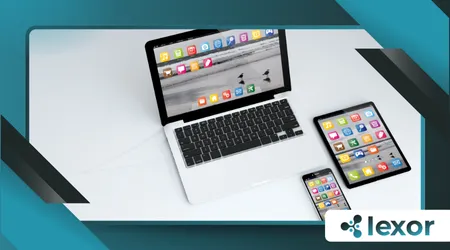Laptops vs. Tablets in 2025: Which is Better for Work and Play?

The debate between laptops vs. tablets has evolved dramatically by 2025, with both devices offering cutting-edge features for productivity and entertainment.
But which one truly reigns supreme? As technology continues to advance, the distinctions between these devices have become increasingly nuanced.
Laptops have embraced futuristic designs like foldable screens and AI-driven performance enhancements, while tablets have matured into powerful tools capable of handling desktop-grade tasks.
The choice between the two now depends on your specific needs, whether you’re a creative professional, a gamer, or someone who values portability above all else.
Let’s dive deeper into the strengths and weaknesses of each device to help you make an informed decision.
The Evolution of Laptops and Tablets
Laptops have come a long way since their clunky beginnings. In 2025, they are sleeker, lighter, and more powerful than ever.
Foldable screens, such as those seen in the Lenovo ThinkPad X1 Fold, allow users to switch between a laptop and tablet mode effortlessly.
Additionally, AI-driven optimizations ensure that performance is tailored to your workflow, whether you’re editing 8K video or running complex simulations.
Tablets, on the other hand, have undergone a similar transformation.
Devices like the Apple iPad Pro and Samsung Galaxy Tab S10 now feature desktop-class processors, such as the M3 and Snapdragon 8 Gen 3, making them capable of handling demanding applications.
The introduction of 5G connectivity and cloud-based workflows has further enhanced their appeal, allowing users to work seamlessly from anywhere.
According to a 2024 report by Statista, 67% of professionals now use hybrid devices, blurring the lines between laptops and tablets.
This shift highlights the growing demand for versatility in a world where remote work and on-the-go productivity are the norm.
Also Read: How to Teach Coding to Kids: A Beginner’s Guide
Performance: Power vs. Portability

When it comes to raw performance, laptops still hold the upper hand.
High-end models like the Dell XPS 15 and MacBook Pro 16-inch are equipped with desktop-grade CPUs and GPUs, making them ideal for tasks like video editing, 3D rendering, and software development.
These devices also offer expandable storage and RAM, allowing users to future-proof their investments.
Tablets, however, have made significant strides in performance. The Apple M3 chip, for instance, delivers desktop-level power in a compact form factor, enabling users to run professional-grade apps like Adobe Premiere Pro and AutoCAD.
While tablets may not match laptops in terms of raw power, their efficiency and portability make them a compelling choice for many users.
Battery life is another area where tablets excel. With optimized mobile chips and energy-efficient displays, devices like the Microsoft Surface Pro 10 can last up to 14 hours on a single charge.
Laptops, while improving, typically offer 8-12 hours of battery life, depending on usage.
| Feature | Laptops | Tablets |
|---|---|---|
| Processing Power | High (desktop-grade CPUs) | Moderate (mobile chips) |
| Battery Life | 8-12 hours | 10-14 hours |
| Portability | Moderate | Excellent |
Laptops vs. tablets – Productivity: Flexibility or Focus?
For professionals who spend hours typing, laptops remain the go-to choice.
The tactile feedback of a physical keyboard, combined with larger screens, makes tasks like writing reports or coding more efficient.
Devices like the HP Spectre x360 and Asus ZenBook Duo also offer dual-screen setups, enhancing multitasking capabilities.
Tablets, however, have carved out a niche in creative fields. The Apple Pencil and Samsung S Pen provide unparalleled precision for digital artists and designers.
Additionally, detachable keyboards and versatile stands allow tablets to adapt to various work environments, from coffee shops to boardrooms.
Cloud-based workflows have further leveled the playing field. With apps like Microsoft 365 and Google Workspace optimized for both laptops and tablets, users can seamlessly switch between devices without losing productivity.
+ How VR is Helping Architects Design the Cities of Tomorrow
Entertainment: Immersion on the Go
When it comes to entertainment, tablets have a clear edge. Their lightweight designs and vibrant displays make them perfect for streaming movies, reading e-books, or playing mobile games.
The iPad Pro’s Mini-LED display, for instance, offers stunning visuals with deep blacks and bright highlights, while the Samsung Galaxy Tab S10’s AMOLED screen delivers rich, lifelike colors.
Laptops, however, excel in immersive experiences. High-end models like the Razer Blade 16 and MacBook Pro 14-inch feature 4K OLED displays and premium audio systems, making them ideal for gaming and movie marathons.
Additionally, laptops support a wider range of gaming titles, from AAA games to indie favorites, thanks to their powerful GPUs.
| Entertainment | Laptops | Tablets |
|---|---|---|
| Display Quality | 4K OLED | 4K Mini-LED |
| Audio | Premium speakers | Good, but limited |
| Gaming | High-end GPU support | Mobile gaming optimized |
Laptops vs. tablets: The Hybrid Future
By 2025, the line between laptops and tablets has blurred. Hybrid devices like the Microsoft Surface Pro X and Apple’s iPad Pro with M-series chips offer the best of both worlds.
These devices combine the portability of tablets with the performance of laptops, making them ideal for users who need versatility.
For example, the Surface Pro X features a detachable keyboard and stylus support, allowing users to switch between work and play effortlessly.
Similarly, the iPad Pro’s Magic Keyboard transforms it into a laptop-like device, complete with a trackpad and backlit keys.
Connectivity and Ecosystem Integration
In 2025, seamless connectivity is a must. Laptops and tablets now integrate effortlessly with other devices in your ecosystem.
Apple’s Continuity feature, for instance, allows users to start a task on their iPad and finish it on their MacBook.
Similarly, Windows 11’s Phone Link feature enables seamless file sharing and notifications between laptops and smartphones.
Tablets, with their always-on 5G connectivity, are particularly well-suited for remote work. Whether you’re attending a video conference or collaborating on a shared document, tablets ensure you stay connected without interruption.
Which Should You Choose?
For heavy workloads, laptops remain unmatched. Their superior processing power, expandable storage, and ergonomic keyboards make them ideal for professionals who demand peak performance.
However, if portability and versatility are priorities, tablets are a compelling choice. Their lightweight designs, long battery life, and creative capabilities make them perfect for on-the-go users.
Ultimately, the decision comes down to your specific needs. If you’re a gamer or content creator, a laptop might be the better option. But if you value portability and flexibility, a tablet could be the way to go.
Frequently Asked Questions
1. Can tablets replace laptops in 2025?
While tablets have become incredibly powerful, they may not fully replace laptops for tasks requiring heavy processing power or extensive multitasking.
2. Are laptops still relevant in 2025?
Absolutely. Laptops remain the preferred choice for professionals who need high performance and ergonomic features.
3. Which is better for gaming: laptops or tablets?
Laptops are better for high-end gaming due to their powerful GPUs, while tablets are ideal for casual and mobile gaming.
4. Do tablets support professional software?
Yes, many tablets now support professional software like Adobe Creative Cloud and Microsoft Office, thanks to their advanced processors.
5. What’s the battery life difference between laptops and tablets?
Tablets generally offer longer battery life, ranging from 10-14 hours, compared to laptops’ 8-12 hours.
In 2025, the laptops vs tablets debate isn’t about superiority—it’s about finding the right tool for your lifestyle.
Both have their strengths, and the best choice depends on how you work and play.
